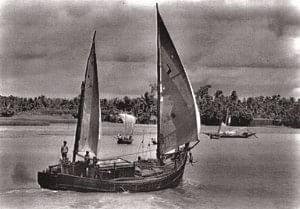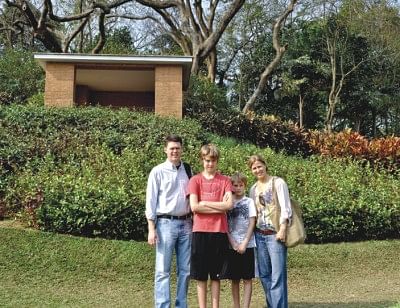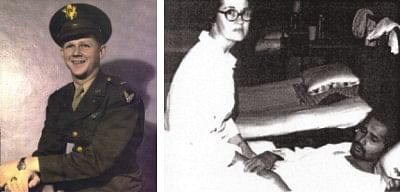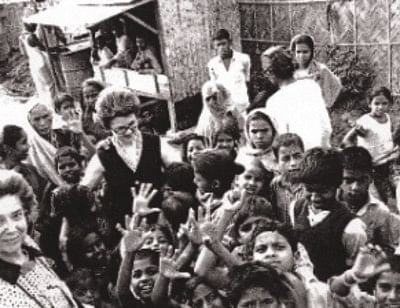| Home - Back Issues - The Team - Contact Us |
 |
| Volume 10 |Issue 10| March 11, 2011 | |
|
|
Special Feature Gone but not Forgotten His grandfather fought and died in the second world war in Sylhet; his grandmother served people in Dhaka injured during the war of liberation; engineer Ryder Booth wonders what brought him to Bangladesh this time while he looks for the remains of his grandfather. Sharier Khan
The World War was drawing closer to the Indian subcontinent. In March 1944, the Japanese forces, allying with Germany, had bashed into Imphal-- the capital of Manipur statewith the view to attack the main part of India. The Japanese forces had taken over the vital Burma Road in China two years back and was making progress ever since. For the allied forces, it was identified by Churchill and Roosevelt that the Burma Road had to be recovered in order to beat the Japanese and eliminate their threat. As part of this plan, the allied forces had formed a Cargo Combat Group. The idea of forming this group was to ensure supplies to the frontline soldiers and evacuate the injured persons from a safe airstrip. The Americans chose Sylhet as their airstrip while the British picked Shamshernagar. In March 1944, the allied forces decided to go offensive on the enemies and mobilise 100 cargo combat planes in the region. Enter Lt Raymond Lowry, a young American pilot who joined the Air Force perhaps a couple of years before. Lowry had married Ruth in November 1942 and was staying in a military facility in California with his wife when his call of duty came. Sometime in 1943, Ruth mothered a son and they named him Thomas Ray Lowry. Lowry moved to Miami to join the duties of flying one of the planes of the Cargo Combat Group. On May 17, 1944 Lowry flew his C47 aircraft with 99 others from Miami to Brazil and then to Africaclearly to avoid the war hotspots of those days. From Africa, they flew and arrived at Karachi on June 5. Within the next couple of years, they were in Sylhet to begin the cargo services.
“The pilots flew back and forth to Imphal with food, equipment and ammunition and fresh troops,” says Lowry's 42-year-old grandson Ryder Booth while talking to The Daily Star in Dhaka recently, “from June 11, they would load the planes at night, fly to Imphal and return by early morning.” The Imphal Runway came under attack by the enemies in late June and the Japanese looted the cargo. In another incident, one of the cargo planes hit another one and caught fire. Amid such incidents, the cargo planes were carrying out their duties. “On July 15, 1944 as co-pilot Lowry along with three others flew to Imphal. But they never returned,” says Booth, “he was reported Missing in Action (MIA)… for 40 long years.” Back home in USA, Ruth Lowry had moved back to her family in Texas when her husband left for the war. In 1946 Ruth married Jack Booth. “My father grew up with his uncle and a cousin. His cousin was more like his brother,” says Ryder.
When Jack Booth married Ruth, he formally adopted Thomas as his son naming him Thomas Ray Lowry Booth. “Jack Booth is a grandfather to me. My dad calls him dad,” Ryder notes, “till 1991, my father spent his life without knowing what exactly happened to his (biological) father.” Back in the fifties, Jack Booth was studying to become a doctor. He was fairly poor back then and his fortunes would not shine on him until later in life. Before becoming a doctor, one has to complete a four-year residency programme with no pay. Thomas had a brother and three sisters before he was drafted into the Air Force during the Vietnam war. “He had a college degree to become an officer and a pilot. He was a B52 Bomber pilot. Gradually he became Squadron Commander. In 1985, he was selected for Naval War College to study Navy Warfare,” says Ryder. “We grew up in air force bases and around air force people. In America, if you grow up in a military community, you are not wealthy. But it's a great, respectful environment to grow up in,” Ryder sheds some light about his own growing up. In 1973 as Jack Booth was establishing his career as an orthopedic surgeon, they received a letter in the mailbox stating “need of humanitarian aid in Bangladesh”. It was from a medical organisation seeking services of Orthopedic Surgeons. Jack became a volunteer to serve in Bangladesh and he gathered that there were many wounded people needing medical attention. Jack and Ruth Booth flew to Dhaka with a load of medical equipment in February '73. They were taken to the Suhrawardi Hospital where hundreds of war wounded and sick soldiers were awaiting treatment. “Their needs overwhelmed my grandparents,” Booth notes. The couple stayed for three to four months at a stretch and returned to USA. They repeated the same routine in 1974, '75 and for the final time in '77.
“In 1973, my grandmother went to Sylhet. But she did not realise if Sylhet had any significance in her life as she did not associate Sylhet with Lowry's base station of the Second World War,” Ryder notes. “We knew about Sylhet being the last station of Lowrybut we did not know if it was in Bangladesh or in India. Because during the Second World War, it was still part of India and that's how we knew it.” After their first humanitarian experiences in Dhaka, the Booth couple later went to serve in Kenya, Papua New Guinea and Pakistan. Meanwhile Lowry continued to be remembered as a hero who was “missing in action”. By sheer luck, that status changed in 1991. “There was a pilot group called Hump Pilots Association,” Booth points out. This association was formed with pilots who fought the world war in China, Burma and India. This association was holding a meeting in which the Booth family members participated. It turned out that many of the pilots of that association had flown with Lowry from Sylhet and they gave their firsthand account. “They said that the Japanese had set up ambushes in the mountains and had launched an attack on the cargo planes flying back from Imphal to Sylhet. Many planes were hit by the bullets; one plane survived with around 300 bullet holes. They were sustaining fire shots from enemy planes as well as from the grounds,” Ryder recalls. The air route was also treacherous as it tended to be very rainy and cloudy in a set up of mountains and hills. “They said that my grandfather's plane was shot down. On July 16, Raymond Lowry's name was read by “Tokyo Rose” on the Japanese radiomeaning that they got hold of him or his body,” Ryder points out. The plane was somewhere between Sylhet and Imphal. “We don't know the exact location,” he adds, “two weeks after that, the British defeated the enemies from Imphal.” With this information, Lowry's relatives now knew what had happened to him.
Meanwhile, Ryder Booth, Thomas's son joined Chevron as an engineer. Till 2010, he has been working in his country as well as some assignments abroad. In 2010, his boss said that there was a job opportunity in Bangladesh and whether he would apply for it. Ryder did and got the job. “When I got the confirmation, I stepped out of a meeting and called my dad telling him: 'hey dad, I got a job in Bangladesh',” Ryder says. “He asked me how close it was to the place where his father had died. Forty five minutes after this conversation, he called again exclaimingson, Sylhet is in Bangladesh. After a while, I called him back and saidSylhet is the place where the gas fields are.” Ryder made a primary visit to Bangladesh for a couple of weeks and fly back soon afterwards. He joined Chevron's Bangladesh duties later in 2010 and flew to Sylhet in November 2010 for the first time. “It was not overwhelming, but it was a surreal feeling for me to be a place which is my dad's father's last place on earth,” Ryder says. Soon afterwards, he went to Jalalabad gas field, got into a room and called his dad, “I'm here in Sylhet.” Ryder says, this was beyond coincidence that he's in Sylhet. In the last four months, Ryder availed all opportunities to see if there was any memorial dedicated to any unnamed solider of world war or if there was any evidence of him anywhere. He toured around the Sylhet airport and communicated with some of the individuals who had worked at the airport for a long time. He went to various graveyards in Sylhet and Shamshernagar and their adjacent tea estates. He also visited the Mynamati world war graveyard. “For my two kids, it's an adventure of a lifetime,” Ryder says, “I worked in Indonesia and China. When you work outside your country, you always feel like you are a guest. But my feelings in Bangladesh is different. My ancestors were here in troubled times. I believe I also came here to make a difference.” The writer is Deputy Editor, The Daily Star
Copyright
(R) thedailystar.net 2010 |




